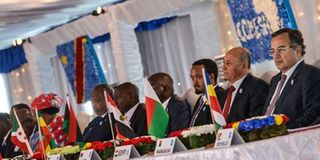Comesa grants Kenya one year sugar safeguard extension

Delegates attend a Common Market for Eastern and Southern Africa (Comesa) summit on February 26, 2014, in Kinshasa. PHOTO | JUNIOR D. KANNAH |
What you need to know:
- Council of Ministers note that the safeguard had made new investment possible.
- The safeguard is subject to review and renewal for another year.
The Common Market for Eastern and Southern Africa has extended Kenya's sugar safeguard by one year subject to review and renewal for another year.
A Comesa press release said the decision was made on Thursday by the Council of Ministers during the start of its two day sitting in Addis Ababa, Ethiopia.
"The extension will operate on the basis of the terms and conditions set out in Directive No. 1 of 2007.
"These included privatising state owned mills, doing research into new early maturing and high sucrose content sugar cane varieties and adopting them, paying farmers on the basis of sucrose content instead of weight, maintaining the safeguard as a tariff rate quota with the quota increasing while the above quota tariff falls until it reaches zero per cent and maintaining and providing infrastructure including roads and bridges in the sugar growing areas."
The statement also noted that Parliament had approved the privatisation of five public sugar companies.
"In making the decision, the Council was guided by a study conducted by the Comesa Secretariat on the competitiveness of the Kenya Sugar Sector.
"The study found, among others, that the safeguard had made it possible for new investors to enter the Kenyan sugar sector. It was noted that without the safeguard, it would have been difficult for these investors to enter a market that was flooded with cheap sugar imports."
'BUSINESS CONFIDENCE'
During the safeguard period, the statement said, the sugar industry composition had changed to about 70 per cent private sector holding in 2014 compared to the initial 33 per cent in 2004 "which illustrated the level of business confidence resulting from the protection".
"It was noted that if the new entrants were given sufficient protection for a period of time, they would stabilise and significantly improve the competitiveness of the sugar industry in Kenya."
The Council of Ministers, in granting Kenya's application for the extension of the safeguard, "underscored the importance of having a system that benefits all sugar exporting member states especially in terms of promoting intra-Comesa trade".
"In this regard the meeting supported the idea of allowing member states to assist meet the sugar deficit in Kenya through country-specific quotas under a formula to be developed. But until then, the current permit system will continue to apply."
Additionally, the Council "directed that the administration of import permits should be simple, quick, transparent and efficient to avoid unnecessary delays that increase the cost of business and limit access to the Kenyan market".
An ad hoc committee should be convened no later than June 30, 2015, the statement said, to "thoroughly deal with a formula for allocating country specific quotas, and the draft criteria for determining that an industry is an infant and report to the next Trade and Customs Committee meeting scheduled for mid year".




